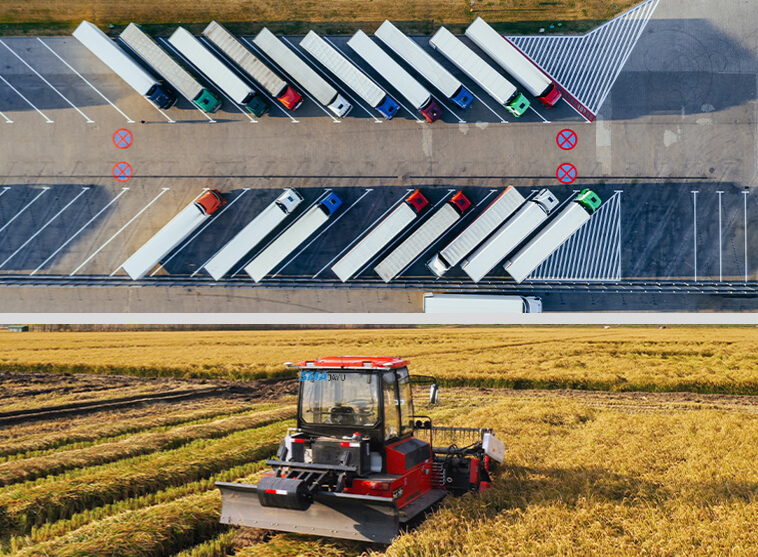In the realm of modern agriculture, precision and efficiency are paramount. One of the revolutionary technologies driving this transformation is GPS auto steering systems. These systems represent a significant leap forward in farm management, offering farmers precise control over their machinery and operations. At the heart of this innovation lies the integration of GPS technology into farming equipment, enabling automated navigation and steering. Let's delve into the intricacies of GPS auto steering systems and their role in shaping the future of agriculture.
Understanding GPS Auto Steering Systems
1. How GPS Auto Steering Works
GPS auto steering systems utilize a network of satellites to accurately determine the position of agricultural vehicles within a field. These systems employ advanced algorithms to interpret satellite signals and calculate precise coordinates in real-time. Integrated into tractors, combines, and other farming machinery, GPS receivers relay this positional data to onboard computers, enabling automated steering functionality. By leveraging this technology, farmers can achieve precise navigation, minimize overlaps, and optimize field coverage with unparalleled accuracy.
2. Components and Functionality
Within a GPS auto steering system, several key components work in harmony to facilitate seamless operation. The GPS receiver serves as the central node, receiving signals from satellites and triangulating the vehicle's position. This information is then relayed to the steering controller, which translates it into steering commands. Actuators connected to the vehicle's steering mechanism execute these commands, adjusting the trajectory to follow predefined paths or contours. Advanced systems may incorporate additional sensors, such as gyroscopes and accelerometers, to enhance stability and responsiveness.
3. Benefits of GPS Auto Steering
The adoption of GPS auto steering systems brings a plethora of benefits to modern farming practices. Foremost among these is increased efficiency, as automated steering reduces the need for manual intervention and minimizes downtime. By precisely maintaining parallel paths and minimizing overlaps, farmers can optimize inputs such as seed, fertilizer, and fuel, resulting in significant cost savings. Moreover, the accuracy afforded by GPS technology enhances productivity by maximizing field coverage and minimizing errors.
Market Status: Growing Demand for Precision Agriculture Solutions
1. Expanding Market Landscape
The market for GPS auto steering systems is experiencing robust growth, driven by the rising demand for precision agriculture solutions. With farmers seeking to optimize yields, minimize environmental impact, and streamline operations, the adoption of advanced technologies is on the rise. According to recent studies, the global market for precision agriculture is projected to reach unprecedented heights, propelled by advancements in GPS technology and increasing farm sizes.
2. Key Players and Offerings
In this dynamic landscape, several prominent players are leading the charge in developing innovative GPS auto steering systems. One such manufacturer making waves in the industry is SMAJAYU. Renowned for its cutting-edge technology and comprehensive solutions, SMAJAYU has garnered widespread acclaim among farmers worldwide. From entry-level guidance systems to high-precision steering solutions, SMAJAYU offers a diverse range of products tailored to meet varying needs and budgets.
3. Case Studies: Success Stories in Precision Agriculture
The efficacy of GPS auto steering systems is perhaps best illustrated through real-world case studies. Across diverse agricultural settings, farmers have witnessed remarkable improvements in efficiency, accuracy, and sustainability upon integrating these systems into their operations. From large-scale commercial farms to small family-owned enterprises, the benefits are undeniable. By minimizing input wastage, optimizing field management, and reducing environmental impact, GPS auto steering systems are revolutionizing modern agriculture.

Addressing Agricultural Needs: Efficiency, Accuracy, and Sustainability
1. Driving Efficiency and Productivity
In an era defined by increasing global food demand and limited resources, the need for enhanced efficiency in agriculture has never been more pressing. GPS auto steering systems offer a pathway to achieving greater productivity while minimizing waste and labor. By automating repetitive tasks and optimizing field operations, farmers can focus their efforts on strategic decision-making and resource management, ultimately driving profitability and sustainability.
2. Optimizing Crop Yields with Precision
Precision is paramount in agriculture, where small variations can have significant ramifications on crop yields and quality. GPS auto steering systems enable farmers to achieve unprecedented levels of accuracy in planting, spraying, and harvesting operations. By precisely controlling input application and maintaining consistent spacing, these systems ensure uniform crop development and maximize yields. This level of precision not only enhances profitability but also promotes sustainable farming practices by minimizing chemical usage and environmental impact.
3. Sustainable Farming Practices
Central to the ethos of precision agriculture is the pursuit of sustainability. GPS auto steering systems play a crucial role in facilitating sustainable farming practices by minimizing resource consumption and environmental impact. By optimizing field operations and reducing wastage, farmers can conserve water, fuel, and other inputs while minimizing soil erosion and runoff. Additionally, precision application techniques enable targeted interventions, minimizing the ecological footprint of agricultural activities and promoting long-term environmental stewardship.
1. Investment Costs and ROI Concerns
The implementation of GPS auto steering systems presents farmers with upfront investment costs, raising concerns about return on investment (ROI). While the benefits of increased efficiency and productivity are clear, convincing farmers to make the initial financial commitment can be a challenge. Manufacturers like SMAJAYU recognize this barrier and work to demonstrate the long-term value proposition of their systems, highlighting potential cost savings and operational improvements over time.
2. Integration Challenges with Existing Machinery
Another hurdle to widespread adoption is the integration of GPS auto steering systems with existing farm machinery and systems. Compatibility issues and retrofitting requirements may deter farmers from embracing new technology. SMAJAYU addresses this challenge by offering seamless integration solutions and compatibility across a wide range of equipment. Through collaborative efforts with manufacturers and distributors, they ensure that their systems can be easily implemented into existing farm operations.
3. Data Security and Privacy Concerns
In an era of increasing data-driven agriculture, concerns about data security and privacy loom large. Farmers may hesitate to adopt GPS auto steering systems due to apprehensions about the protection of sensitive information, such as field boundaries and crop yields. SMAJAYU prioritizes data security and privacy, implementing robust encryption protocols and user authentication measures to safeguard farmer data. Transparent communication and compliance with data protection regulations further reassure farmers of the safety of their information.

4. Mitigating Resistance to Change
Resistance to change is a common challenge in any industry, and agriculture is no exception. Farmers may be hesitant to embrace new technologies, fearing disruptions to their established workflows and practices. SMAJAYU employs targeted outreach and education initiatives to address this resistance, providing farmers with comprehensive training and support services. By demonstrating the tangible benefits of GPS auto steering systems and offering personalized guidance, they empower farmers to embrace innovation with confidence.
Empowering Agricultural Distributors: Providing Value-added Services
1. Comprehensive Training and Support
Agricultural distributors play a crucial role in facilitating the adoption of GPS auto steering systems among farmers. SMAJAYU collaborates closely with distributors to provide comprehensive training and support services, ensuring that farmers receive the guidance they need to maximize the benefits of their systems. From installation assistance to ongoing technical support, these value-added services enhance the user experience and promote long-term satisfaction.
2. Customization Options for Diverse Needs
Recognizing the diverse needs of farmers across different regions and agricultural sectors, SMAJAYU offers customization options for their GPS auto steering systems. By tailoring solutions to specific operational requirements, they cater to a wide range of farming operations, from small-scale family farms to large commercial enterprises. This flexibility allows farmers to optimize their investments and achieve optimal results in their unique contexts.
3. Collaboration with Software Developers
In the rapidly evolving landscape of precision agriculture, collaboration is key to driving innovation and enhancing system functionality. SMAJAYU partners with software developers to integrate advanced features and capabilities into their GPS auto steering systems. By leveraging cutting-edge technologies such as artificial intelligence (AI) and machine learning, they enable autonomous farming practices and empower farmers with real-time insights and decision-making tools.
4. Bundling with Precision Agriculture Technologies
To further enhance the value proposition and market competitiveness, SMAJAYU explores opportunities to bundle GPS auto steering systems with other precision agriculture technologies. By offering integrated solutions that address multiple aspects of farm management, they provide farmers with comprehensive tools for optimizing efficiency and productivity. This approach not only simplifies procurement and implementation but also maximizes the synergies between different technologies, unlocking additional value for farmers.
Conclusion: Paving the Way for the Future of Agriculture
As the agricultural landscape continues to evolve, GPS auto steering systems stand at the forefront of innovation, driving efficiency, accuracy, and sustainability in farming practices. With the market witnessing unprecedented growth and adoption rates soaring, the future looks promising for precision agriculture. Manufacturers like SMAJAYU are leading the charge, providing farmers with the tools they need to navigate the complexities of modern farming with confidence and precision. As technology continues to advance and awareness of sustainable practices grows, GPS auto steering systems will undoubtedly play an instrumental role in shaping the future of agriculture for generations to come.


